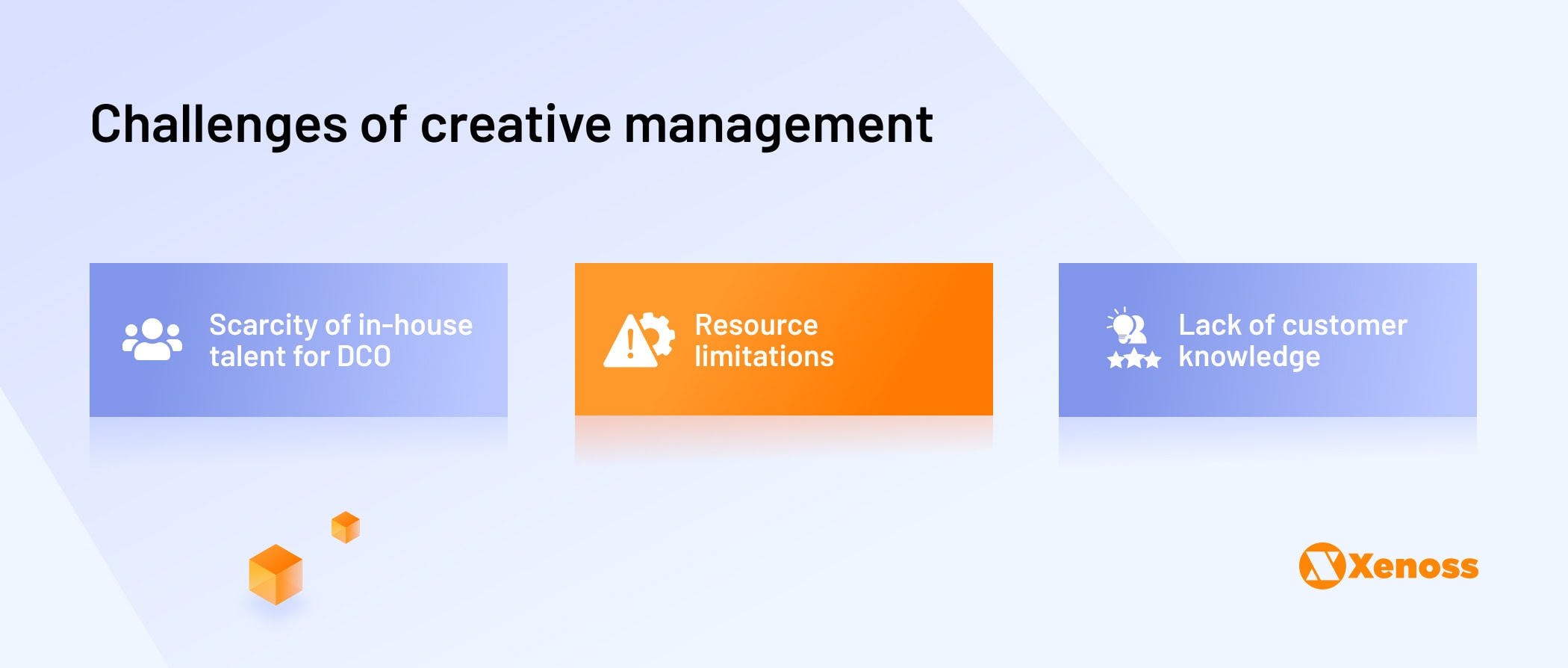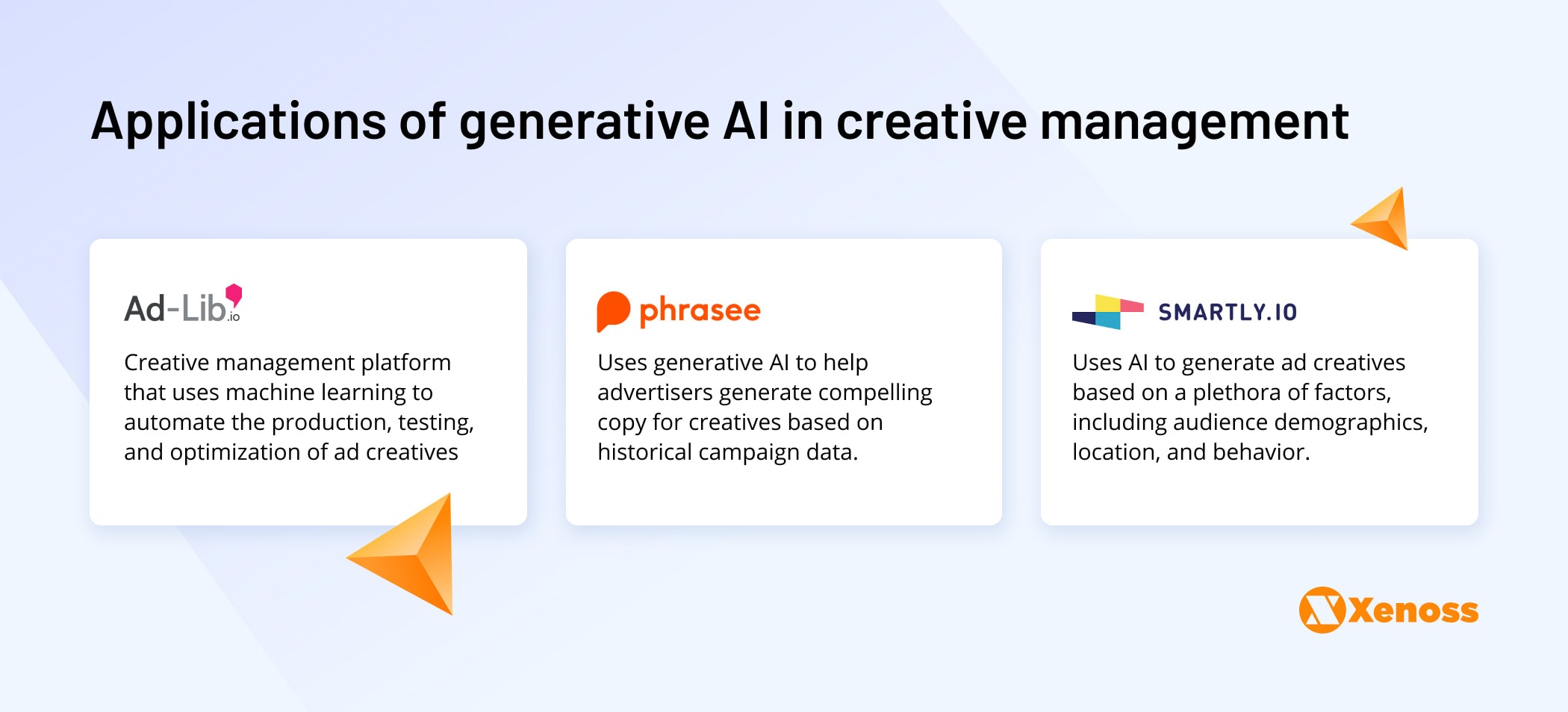In the clamoring marketplace of attention, advertisers focus on securing the perfect placements, pinpointing target demographics, and selecting the most effective channels, all while frugally restraining their budgets. However, in this pursuit, the focus on the content of ad creatives ends up on the sidelines.
Not paying enough attention to the content of their ads curtails brands from attaining their milestones and generating revenue.
A study conducted by KANTAR indicates that a premium-quality creative can magnify an ad campaign’s performance twelvefold, leading to a 30% surge in return on investment.
Machine learning (ML) is a powerful ally that allows agencies and advertisers to refine their creative operations without neglecting other components of their strategy. In today’s blog post, we delve into the applications of generative artificial intelligence (AI) in creative management, its merits, and the obstacles that AdTech vendors might face in implementation.
The hurdles to crafting high-performance creatives
Here’s a brief insight into the difficulties that forestall creative departments from amplifying the influence of their brand assets.

- Scarcity of in-house resources for hands-on dynamic creative optimization (DCO). The shortage of time, talent, or resources to support a steady creative production engine remains a prevalent worry for 66% of creative teams. The production of multiple iterations of ad creative is a time-intensive task, so many teams still prioritize A/B testing over fully embracing DCO.
- Resource limitations. According to the data by Nielsen Ad Intel, the US advertising market has seen a 7% contraction. As brands start downscaling, creative teams end among the first departments to be laid off, while marketers and agencies prioritize other budget line items of the campaign over creatives.
- Lack of customer knowledge hinders successful personalization. Crafting a universally successful ad is an impractical endeavor. Creative teams require an intricate comprehension of their target demographics to concoct a truly compelling ad copy – as per IBM, only 34% of advertisers currently exhibit this understanding. When teams lack a thorough understanding of their audience’s preferences and behaviors, they face difficulties in creating effective creatives that drive conversions.
The case for incorporating AI into creative management platforms
AdTech companies have been actively incorporating generative AI functionality in their platforms and products. Here’s why it is a smart and forward-facing move for AdTech projects.
- The surge in demand from marketers and advertisers. A forecast from Statista suggests that AI’s application in advertising will escalate to surpass $107 billion by 2028, signaling a robust and continuous demand for AI tools. Thus, early adopters of these technologies have a high chance of securing a considerable edge in this fiercely competitive landscape.
- Attention from media and investors. The addition of AI functionalities to their offerings could draw AdTech vendors into the spotlight of media and investors. According to the Stanford Artificial Intelligence Report Index 2023, global AI investment reached nearly $92 billion in 2022. This year, AI’s status as the tech’s next big thing has only further solidified, making AI integrations a must-have in AdTech, among other fields.
- Potential to drive down production costs. In a time of economic downturn, advertising teams are inclined to select tools based on their potential for cost reduction. AI solutions fill the bill, as they promote efficiency by enabling teams to create myriad ad versions finely tuned to their respective audiences at low-to-no cost. Cutting production and optimization costs can allow AI vendors to reallocate saved resources to media spend or a different budget category.
How generative AI is ramping up the efficiency of creative management
Strapped for resources and inundated with work, creative teams don’t have the luxury of meticulously fine-tuning their creatives. As resources dwindle for advertisers and agencies, technology becomes a pivotal ally, making tasks such as visual and copy testing or ad size optimization more manageable.

The potential of generative AI stands out, particularly in various facets of creative management.
- Ad testing. The combination of machine learning and data science presents an avenue for advertisers and agencies to streamline their campaigns more proficiently. Ad-Lib.io, a creative management platform built in partnership with Xenoss, uses machine learning to automate the production, testing, and optimization of ad creatives. This allows marketers to quickly and effortlessly generate an array of ads designed to match different types of advertising channels.
- Crafting copy and images. AI-enabled tools assist advertisers and agencies in crafting an optimal copy or selecting a captivating visual for a creative in an upcoming campaign. Phrasee is a successful use case of generative AI that helps advertisers generate compelling copy for creatives. The high-performing copy is designed probabilistically by examining historical campaign data and detecting which word choices and creative concepts resonated with audiences.
- DCO. AI tools empower marketers to rapidly and seamlessly generate ad variations specifically tailored for distinct audience segments. Smartly.io, a frontrunner in this field, uses AI to generate ad creatives based on a plethora of factors, including audience demographics, location, and behavior.
Considerations for introducing generative AI to creative management platforms
Though the value of machine learning in the generation of creatives and DCO is evident, teams frequently struggle with finding a generative AI application that would keep a low cost-to-benefit or building scalable infrastructures to support large machine learning models.
Here are the challenges Xenoss engineers have seen AdTech vendors grapple with on their journey to AI implementation.
- Models generate false outputs. Large generative AI models like GPT and DALL-E boast the ability to produce ad copy and visuals in seconds – but the content created by these algorithms can be riddled with errors. On several occasions, marketers noticed that AI-generated ads showed false prices. Therefore, it’s up to AdTech vendors to create strategies for verifying the accuracy of AI-generated creatives to not let brands down in their campaigns.
- Latency undermining performance. The task of integrating AI into DCO platforms is complicated by the necessity for low latency in AdTech projects. Sophisticated machine learning models demand substantial computational resources, and their addition to DCO and creative management platforms can extend response times, thus compromising performance.
- High deployment costs. If the engineering team does not have a solid track record of AI/ML implementation, the costs of training, deploying, and maintaining models can skyrocket over time. It is crucial for vendors to have the working knowledge of cost-reduction mechanisms – autoscaling CPU, automating Amazon Web Services instances, and so on – that help keep models feasible.
Having machine learning engineers as part of the in-house team is a valuable starting point for the introduction of generative AI into DCO platforms or creative management platforms (CMPs). Nonetheless, due to the intricate technical nature of ML models and the specificities of AdTech as a field, it would be reasonable to assemble a team of seasoned engineers dedicated solely to AI implementation.
Building a pool of machine learning talent: a strategic imperative for AdTech vendors
Securing a competent tech partner is vital for AdTech vendors contemplating the incorporation of generative AI into their offerings. Here’s our take on how collaboration with a team of ML engineers can shield AdTech vendors from strategic missteps in charting their AI course.
- Access to specialized know-how: By joining forces with a tech partner, vendors gain the capability to build custom models: these might include algorithms geared towards spotting attention-grabbers within creatives, forecasting the success of individual assets, and optimizing creatives for cross-channel advertising.
- Reduced time-to-market: Tech teams with a focus on developing generative AI models typically possess a tried and tested approach to collecting data specific to their use case and training models. Collaboration with such a team spares in-house engineers the effort of building a strategy from the ground up. This, in turn, enables AdTech vendors to make substantial reductions in their time-to-market.
- Tech and business alignment: A tech partner who closely cooperates with the in-house team will have a nuanced understanding of the project’s requirements. Constant interaction with the product team will allow outside tech partners to make sure the tech behind the feature is geared towards business goals.
Bottom line
For AdTech vendors making inroads into creative management solutions, the integration of AI into their projects helps differentiate and bolster their offerings.
Generative AI, in particular, has a significant impact on creative management platforms and DCO tools. It can instantaneously produce creatives, optimize them in real time, and personalize assets to spike interest in target demographics.
How should AdTech vendors go about the introduction of generative AI to their platforms? Crafting a clear use case, accumulating reliable data for model training, and partnering with an experienced, AdTech-focused team of AI and machine learning engineers will give project teams greater confidence and assurance in the success of their model.